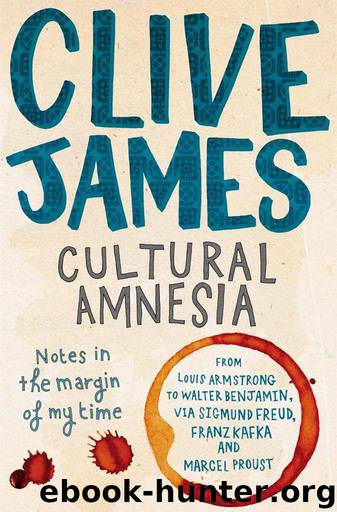Cultural Amnesia by Clive James

Author:Clive James [James, Clive]
Language: eng
Format: epub
ISBN: 9780330462471
Publisher: Macmillan Publishers UK
Published: 2008-09-04T00:00:00+00:00
THOMAS MANN
So enormous at first glance that he might convince us he can safely be read about rather than read, Thomas Mann (1875–1955) is nevertheless the twentieth-century cultural figure most likely to keep coming back into the student’s life. We begin by thinking we can do without him, and end by realizing that there is no getting rid of him. In his life and in his art, he incorporated every question about the history of modern Germany, and its place in Europe and the world. He began as a conservative believer in Germany’s national strength, a belief that was an early source of conflict between himself and his radical elder brother, Heinrich. His novel Buddenbrooks (1901) was the story of a prosperous family that declined because it became artistically more sensitive: still a usefully original emphasis, even today. The student would do better to begin, however, with the brief and easily memorable Death in Venice (1912), and then move on, taking the journey by easy stages, to the monumental novel that set Mann on the path to world fame and the Nobel Prize, The Magic Mountain (1924). In the lofty setting of an Alpine TB clinic, the intensity of what does not happen between the young hero Hans Castorp and the bewitching consumptive Claudia Chauchat raises the subject of Mann’s sexuality, which remained a nagging question throughout his career. (The quickest answer is that Thomas Mann the solid paterfamilias also led a fantasy life cast with handsome young men, most of them barely glimpsed in reality: a smile from a waiter could get him started on a novel.) In the early 1930s, when he had already made his opinion well known that Hitler was a threat to all values, the incoming Nazis would have dearly liked to brand their most conspicuous literary enemy as a homosexual. Though Mann’s wife, Katya, was a half Jew, Mann himself was all Aryan, but Reinhard Heydrich had correctly identified him as a friend of Jewish culture and had put his name high on a list of those absentees to be dealt with if they came back to Germany.
Mann, out of the country on a reading tour when Hitler came to power, sensibly kept going. Eventually he went all the way to America, where, in exile, he completed his seemingly inexorable rise to prominence as Germany’s most exalted cultural figure since Goethe. That he himself thought in those terms should not be allowed to detract from our estimation of him. Like his snobbery, thin skin, theatrical fastidiousness and insatiable hunger for honours, his towering pride was a functional element in his ability to focus his creative energy in circumstances that deprived many of his fellow exiles of their capacity to work at all. Even when occupied with such a huge task as his sequence of novels about Joseph and his brothers, however, he found time to help some of his fellow refugees (Jews included: the idea that Thomas Mann was anti-Semitic is a calumny) and to record radio broadcasts to Germany about what the Nazis were really up to.
Download
This site does not store any files on its server. We only index and link to content provided by other sites. Please contact the content providers to delete copyright contents if any and email us, we'll remove relevant links or contents immediately.
| Deconstruction | Existentialism |
| Humanism | Phenomenology |
| Pragmatism | Rationalism |
| Structuralism | Transcendentalism |
| Utilitarianism |
The remains of the day by Kazuo Ishiguro(8955)
Tools of Titans by Timothy Ferriss(8351)
Giovanni's Room by James Baldwin(7305)
The Black Swan by Nassim Nicholas Taleb(7091)
Inner Engineering: A Yogi's Guide to Joy by Sadhguru(6778)
The Way of Zen by Alan W. Watts(6580)
Asking the Right Questions: A Guide to Critical Thinking by M. Neil Browne & Stuart M. Keeley(5743)
The Power of Now: A Guide to Spiritual Enlightenment by Eckhart Tolle(5734)
The Six Wives Of Henry VIII (WOMEN IN HISTORY) by Fraser Antonia(5490)
Astrophysics for People in a Hurry by Neil DeGrasse Tyson(5171)
Housekeeping by Marilynne Robinson(4425)
12 Rules for Life by Jordan B. Peterson(4293)
Double Down (Diary of a Wimpy Kid Book 11) by Jeff Kinney(4253)
The Ethical Slut by Janet W. Hardy(4234)
Skin in the Game by Nassim Nicholas Taleb(4225)
Ikigai by Héctor García & Francesc Miralles(4223)
The Art of Happiness by The Dalai Lama(4117)
Skin in the Game: Hidden Asymmetries in Daily Life by Nassim Nicholas Taleb(3980)
Walking by Henry David Thoreau(3941)
